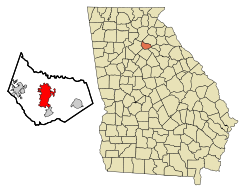Winder, Georgia
| Winder, Georgia | |
|---|---|
| City | |

Barrow County Courthouse
|
|
| Motto: "City of Opportunity" | |
 Location in Barrow County and the state of Georgia |
|
| Coordinates: 33°59′47″N 83°43′15″W / 33.99639°N 83.72083°WCoordinates: 33°59′47″N 83°43′15″W / 33.99639°N 83.72083°W | |
| Country | United States |
| State | Georgia |
| County | Barrow |
| Area | |
| • Total | 12.9 sq mi (33.5 km2) |
| • Land | 12.4 sq mi (32.2 km2) |
| • Water | 0.5 sq mi (1.3 km2) |
| Elevation | 988 ft (301 m) |
| Population (2010) | |
| • Total | 14,099 |
| • Density | 1,136/sq mi (438.5/km2) |
| Time zone | Eastern (EST) (UTC-5) |
| • Summer (DST) | EDT (UTC-4) |
| ZIP code | 30680 |
| Area code(s) | 470/678/770 |
| FIPS code | 13-83420 |
| GNIS feature ID | 0325442 |
| Website | www |
Winder is a city in Barrow County, Georgia, United States. It is located east of Atlanta and is part of the Atlanta metropolitan area. The population was 14,099 at the 2010 census. The first syllable of Winder is pronounced like "wine". The city is the county seat of Barrow County.
Winder was a place for early settlement, being first occupied hundreds of years ago by Creek Indians, who called it Snodon. Activities centered around what are now Athens and Church streets. When white settlers established homes and farms near that village in 1793, the town was renamed, becoming The Jug, and, ten years later; Jug Tavern. At that time, the town had a population of 37 persons. The first school was built on 11.5 acres, known as the Academy Lot, located at the intersection of West Athens and Church streets. An historic marker now commemorates the site. For protection from hostile Indians, Fort Yargo was constructed, one of four such forts built in the area by the Humphrey brothers.
Jug Tavern grew slowly during the decades before the Civil War. The town, at the time of its origin, extended from the railroad crossing of Broad Street (then known as Jefferson Road) for one-half mile into three counties: Jackson, Walton and Gwinnett. In 1884, Jug Tavern was incorporated by the Georgia General Assembly. It was first governed by a mayor and four aldermen who were elected annually. The first mayor, N. J. Kelly, took the oath of office on January 8, 1885.
During the Civil War, Jug Tavern was largely untouched, though a number of its young men fought in several battles. Towards the end of that conflict, however, as the northern armies of General William T. Sherman approached, two important skirmishes took place nearby; first in the fight known as the Battle of Jug Tavern in July 1864, and, during the following month, the Battle of King's Tanyard.
That decade and the next were pivotal in Winder's history. The city began to achieve prominence with the construction of railroads. The Gainesville Midland Railroad (then the Gainesville, Jefferson and Southern Railroad) built tracks through Jug Tavern along Midland Avenue in 1883, connecting it with Gainesville and Social Circle, with other stops at Bethlehem and Mulberry. The Georgia, Carolina and North Railroad (later to be merged with the Seaboard Air Line Railrway) was planned to pass four miles south of Jug Tavern, but enterprising local citizens deeded 16 acres for $10 to induce the railroad to pass through the town, which it first did on April 24, 1892, with 150 passengers on board. Jug Tavern henceforth became a station on the Atlanta and Athens run, and a depot was erected that year. Most of the early commercial activity which came to the heart of Downtown was located between these two rail lines.
...
Wikipedia
